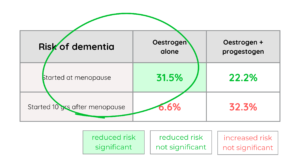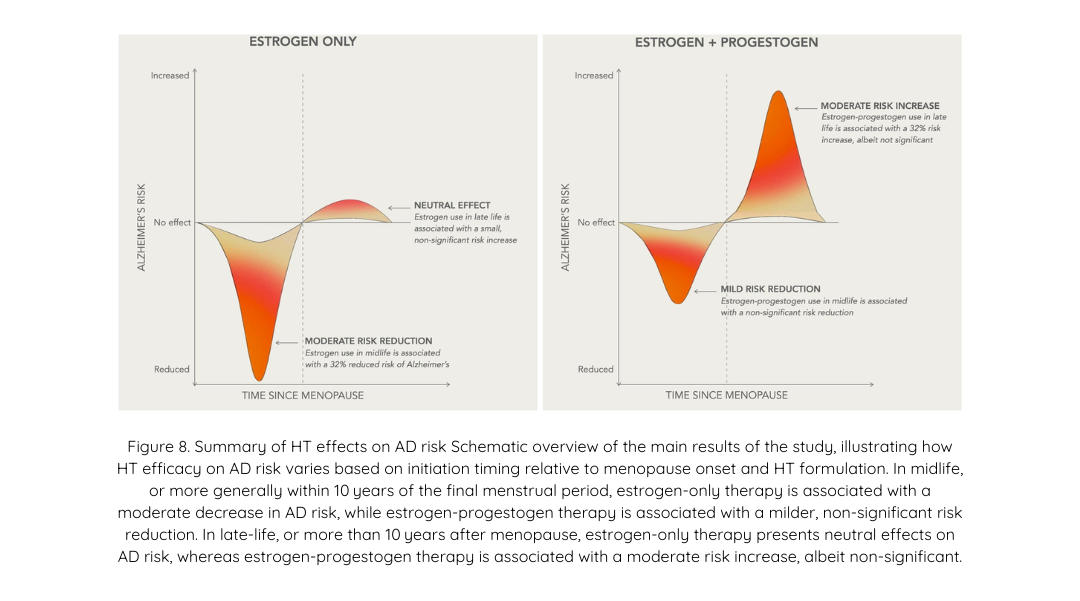As women age, one of the fears they often have is the risk of developing Alzheimer’s disease or other forms of dementia. The role of menopause hormone therapy (MHT) in either increasing or decreasing this risk has been a source of confusion. However, a recent meta-analysis, which is a study that combines and analyses data from various other studies, is shedding some light on this matter.
Prior to this meta-analysis, high-quality randomised control trials were scarce but indicated an increased risk of dementia in women using MHT. On the other hand, observational and cohort studies suggested a reduced risk of dementia for those using MHT.
The meta-analysis examined the data by considering when women started MHT, either around the time of their last period or 10 or more years later, and also took into account the type of MRT used (oestrogen alone or oestrogen and progestogen). The results showed a reduced risk of developing Alzheimer’s disease and other forms of dementia for women who started using MHT around the time of menopause, particularly when using oestrogen alone. There was also a reduced risk for women starting MHT around menopause who used both oestrogen and progesterone, although this result wasn’t statistically significant. In scientific terms, “statistical significance” refers to the likelihood that the results observed are not due to chance alone, typically set at a P value of .05 or less, meaning less than a 5% probability of the findings occurring by chance.

However, for women who started MHT 10 years or more after their last period, the research indicated an increased risk of dementia, especially with combined therapies, and a non-statistically significant increase when using oestrogen alone. This finding aligns with the timing hypothesis, which suggests that the benefits of MHT are most pronounced when initiated close to the last period, and introducing hormones after this window might potentially increase any risk. This is akin to the body’s adaptation to lower hormone levels over time, and reintroducing hormones later could have adverse effects. This is similar to what is observed with cardiovascular disease.
 Like all research, it raises more questions.
Like all research, it raises more questions.
Why does combined MHT not confer the same benefit? The women in most of these studies were using non-body-identical progestogens (also known as “progestins”). The impact of body-identical progesterone is not currently known.
When will there be a definitive, high quality randomised trial se we can know for sure? This is unlikely to happen. The average ages of menopause is 51 and the average aged of dementia onset is 71 – so any trial would need to extend 20 years. The cost and logistics make this prohibitive. We will have to work within what is possible!
While this may seem like good news, it’s crucial to understand that the effect is relatively small. The reduced risk associated with MHT is comparable to other lifestyle factors that can help prevent Alzheimer’s and other dementias, and it’s less impactful than engaging in regular physical activity and managing healthy blood sugar levels.
Reduces risk of dementia-
- Physical activity 50%
- MHT (oestrogen alone) 32%
- MHT (combined EP) 22% (not signif)
Increases risk of dementia-
- Diabetes 50%
- Obesity 35%
- Smoking 30%
In essence, this research underscores the importance of the timing of MHT in relation to menopause. It appears to offer some protection when used close to the last period, but the effect reverses when initiated later. Additionally, the benefit, while noteworthy, should be considered in the context of other healthy lifestyle choices for overall well-being.
Read the full paper here-
Systematic review and meta-analysis of the effects of menopause hormone therapy on risk of Alzheimer’s disease and dementia.
Nerattini et al. Front. Aging Neurosci., 23 October 2023
This information is for general educational purposes only and does not constitute medical advice. Please see your health professional for advice that is personalised to you.
Key Take Aways
Starting oestrogen only MHT at menopause reduces your risk of dementia
Starting combined MHT (oestrogen + progestogen) at menopause may reduce your risk
Starting MHT more than 10 years after menopause may increase your risk.
The magnitude of benefit is similar to regular physical activity, maintaining healthy weight and blood sugar.






